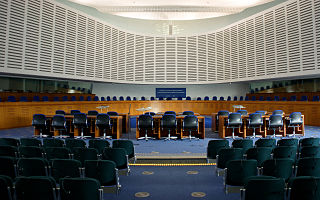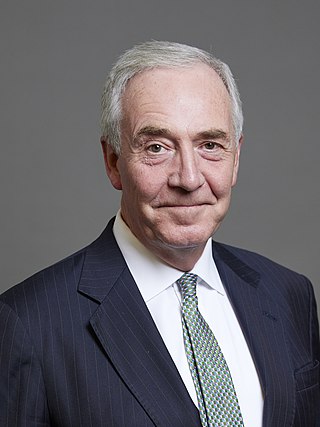Related Research Articles

The European Convention on Human Rights is an international convention to protect human rights and political freedoms in Europe. Drafted in 1950 by the then newly formed Council of Europe, the convention entered into force on 3 September 1953. All Council of Europe member states are party to the convention and new members are expected to ratify the convention at the earliest opportunity.
Barbora Bukovská is a Czech-Slovak human rights attorney and activist, known for her work on racial discrimination of Romani people in the Czech Republic and Slovakia. Before anti-discrimination laws were adopted, she initiated the first Czech strategic litigation cases concerning discrimination against Romani people in access to public services, housing, employment and within the criminal justice system, and used the courts to bring a change in the law.
Evans v. the United Kingdom was a key case at the European Court of Human Rights. The case outcome could have had a major impact on fertility law, not only within the United Kingdom but also the other Council of Europe countries.
Article 8 of the European Convention on Human Rights provides a right to respect for one's "private and family life, his home and his correspondence", subject to certain restrictions that are "in accordance with law" and "necessary in a democratic society". The European Convention on Human Rights (ECHR) is an international treaty to protect human rights and fundamental freedoms in Europe.
Privacy in English law is a rapidly developing area of English law that considers situations where individuals have a legal right to informational privacy - the protection of personal or private information from misuse or unauthorized disclosure. Privacy law is distinct from those laws such as trespass or assault that are designed to protect physical privacy. Such laws are generally considered as part of criminal law or the law of tort. Historically, English common law has recognized no general right or tort of privacy, and offered only limited protection through the doctrine of breach of confidence and a "piecemeal" collection of related legislation on topics like harassment and data protection. The introduction of the Human Rights Act 1998 incorporated into English law the European Convention on Human Rights. Article 8.1 of the ECHR provided an explicit right to respect for a private life. The Convention also requires the judiciary to "have regard" to the Convention in developing the common law.
Von Hannover v Germany [2004] was a case decided by the European Court of Human Rights in 2004. The Court ruled that German law breached Article 8 of the European Convention on Human Rights.
Latvian Human Rights Committee is a non-governmental human rights organization in Latvia. It is a member of international human rights and anti-racism NGOs FIDH, AEDH. Co-chairpersons of LHRC are Vladimir Buzayev and Natalia Yolkina. According to the authors of the study "Ethnopolitics in Latvia", former CBSS Commissioner on Democratic Institutions and Human Rights Ole Espersen "had visited LHRC various times and had used mostly the data of that organisation in his views on Latvia".

Beghal v DPP was a 2015 judgment of the Supreme Court of the United Kingdom concerning powers of the police in England and Wales.
Zakharov v. Russia was a 2015 court case before the European Court of Human Rights involving Roman Zakharov and the Russian Federation. The Court ruled that Russia's legal provisions governing communications surveillance did not provide adequate safeguards against arbitrariness or abuse, and that therefore a violation took place of Article 8 of the European Convention of Human Rights.

Chiragov v. Armenia was an international human rights case regarding the rights to property of Azeri nationals in the Nagorno-Karabakh region of former Soviet Azerbaijan. The judgment of the Grand Chamber of the European Court of Human Rights on the case originated in an application against the Republic of Armenia lodged with the Court under Article 34 of the Convention for the Protection of Human Rights and Fundamental Freedoms by six Azerbaijani nationals on 6 April 2005. The applicants alleged, in particular, that they were prevented from returning to the district of Lachin in territory occupied by the respondent Government, that they were thus unable to enjoy their property and homes located there, and that they had not received any compensation for their losses.

David William Kinloch Anderson, Baron Anderson of Ipswich, is a British barrister and life peer, who was the Independent Reviewer of Terrorism Legislation in the United Kingdom between 2011 and 2017. On 8 June 2018 it was announced that he would be introduced to the House of Lords as a cross-bench (non-party) working peer. On the same day he was appointed a Knight Commander of the Order of the British Empire (KBE), for services to national security and civil liberties, in the Queen's 2018 Birthday Honours.
E.S v. Austria was a case held before the European Court of Human Rights (ECtHR) case where the court upheld a domestic court's fine on an Austrian woman who had called Mohammed a pedophile.
Slovenian Disability Rights Association is a disability rights organization in Slovenia. Its goals are to enhance the implementation of the Convention on the Rights of Persons with Disabilities and to assist persons with disabilities through awareness raising and impact litigation. Drupis was founded in 2012.
M.C. and Others v Italy is a case decided by the European Court of Human Rights (ECHR) on 3 September 2013 in which Article 1 of Protocol 1 (A1P1) was engaged due to the applicants not being afforded annual uprating which the court deemed damage to their property of a disproportionate character in the form of an exorbitant charge. The Strasbourg ruling sets an important precedent for higher monthly compensation payments to be paid to the 60,000 or so victims of contaminated blood transfusions in Italy. The effect of this ruling increased payments to the applicants by 40%.
Fedotova and Others v. Russia was a case submitted by six Russian nationals to the European Court of Human Rights (ECtHR).
Bayev and Others v. Russia was a case brought to the European Court of Human Rights by three Russian activists—Nikolay Bayev, Aleksei Aleksandrovich Kiselev, and Nikolay Alekseyev—alleging that the Russian gay propaganda law infringed on their freedom of expression guaranteed by Article 10 of the European Convention on Human Rights. On 20 June 2017, the court ruled that the applicants' freedom of expression had been compromised. The only dissent was from Dmitry Dedov, the judge elected with respect to Russia.

Sargsyan v. Azerbaijan was an international human rights case regarding the rights of Armenian refugees displaced from former Soviet Azerbaijan because of the conflict in Nagorno-Karabakh. The judgment of the Grand Chamber of the European Court of Human Rights on the case originated in an application against the Republic of Azerbaijan lodged with the Court under Article 34 of the Convention for the Protection of Human Rights and Fundamental Freedoms by Minas Sargsyan on 11 August 2006. He was forced to flee his home in the village of Gulistan in Shahumyan region of former Soviet Azerbaijan, together with his family, because of the Azerbaijani bombardments of the village and was not allowed to return and unable to get any compensation from the Azerbaijani authorities. Even though the applicant died in 2009, as did his widow, Lena Sargsyan, in 2014, his children, Vladimir and Tsovinar Sargsyan, represented him in court to continue the proceedings.
References
- ↑ "HUDOC Search Page". Cmiskp.echr.coe.int. Retrieved 27 October 2013.
- ↑ Archived March 31, 2009, at the Wayback Machine
- ↑ Rawlinson, Kevin (26 February 2010). "Mosley case on privacy laws 'is being fast-tracked' - Europe - World". The Independent. London. Retrieved 27 October 2013.
- ↑ David Leigh (31 March 2010). "Media groups lobby Strasbourg over Max Mosley 'threat to freedom' | Media". London: theguardian.com. Retrieved 27 October 2013.
- ↑ "MLDI intervention helps defeat prior notification demand | Media Legal Defence Initiative". Mediadefence.org. 10 May 2011. Archived from the original on 29 October 2013. Retrieved 27 October 2013.
- ↑ [ dead link ]
- ↑ "Factsheets". Echr.coe.int. Retrieved 27 October 2013.
- 1 2 3 "Mosley v UK" (PDF). Retrieved 27 February 2018.
- ↑ "European court of human rights judgment on Max Mosley: conclusion". The Guardian. 10 May 2011. Retrieved 27 February 2018.
- ↑ Clive Coleman (10 May 2011). "BBC News - Max Mosley loses European court privacy law bid". Bbc.co.uk. Retrieved 27 October 2013.
- ↑ "HUDOC Search Page". Cmiskp.echr.coe.int. Retrieved 27 October 2013.
- ↑ "Max Mosley loses European Court privacy case". The Telegraph . London. 10 May 2011. Retrieved 27 October 2013.
- ↑ Peppiatt, Richard (11 May 2011). "Britain's freedoms weren't at risk in the Max Mosley case – tabloid editors' were". The Guardian . London. Retrieved 27 October 2013.
